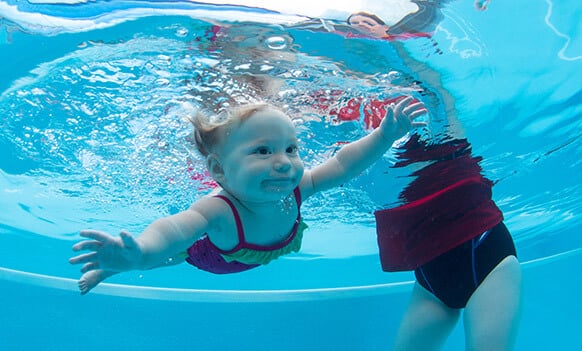
Swimming is more than just a life-saving skill—it’s a powerful way to boost your child’s confidence. From mastering physical challenges to navigating social situations, learning to swim opens doors to personal growth, self-assurance, and joy. This article delves into the myriad ways swimming can foster confidence in young children, emphasizing its physical, mental, and emotional benefits.
Overcoming Fear and Building Resilience
Many children experience an initial fear of water. Overcoming this fear during swimming lessons is a transformative experience that can significantly boost their confidence. By gradually acclimating to the water, learning basic strokes, and eventually swimming independently, children build resilience. Each small victory, such as floating for the first time or jumping into the pool without hesitation, reinforces their ability to face and conquer challenges.
This process teaches a crucial life lesson: that persistence and effort can turn fears into achievements. When children internalize this mindset, they become more willing to tackle other daunting situations outside the pool, such as trying a new activity, speaking up in class, or making new friends.
Developing Physical Competence
Swimming is a unique skill that engages the whole body. As children learn to coordinate their movements, regulate their breathing, and refine their strokes, they experience a sense of mastery over their physical abilities. This accomplishment fosters a deep sense of pride, reinforcing their belief in their capabilities.
Physical competence directly contributes to confidence. When children feel strong, capable, and in control of their bodies, they are more likely to approach new situations with enthusiasm rather than apprehension. The buoyancy and support of water also provide a forgiving environment, making it easier for children to experiment and succeed without fear of injury.
Fostering Independence
One of the most empowering aspects of learning to swim is the independence it fosters. As children gain confidence in the water, they realize they can move, float, and navigate without constant assistance. This newfound autonomy is a confidence booster, as it shows them they can rely on their own abilities.
Parents often notice a ripple effect of this independence. A child who learns to swim may begin to exhibit more self-reliance in other areas. These areas include dressing themselves, tackling schoolwork, or problem-solving during play. This growing independence contributes to a positive self-image and a stronger belief in their capabilities.
Enhancing Social Skills and Teamwork
Swimming lessons often take place in group settings, providing a wonderful opportunity for children to develop social skills. Interacting with peers, following instructions from instructors, and participating in group games all help children build relationships and learn teamwork.
Confidence flourishes in social contexts when children feel included and valued. Success in swimming, such as receiving praise from a coach or earning a certificate, boosts self-esteem. It encourages children to share their accomplishments with others. These interactions can help shy or introverted children come out of their shells, knowing that their efforts are recognized and celebrated.
Cultivating a Growth Mindset
Learning to swim involves gradual progress, and children quickly learn that improvement comes with practice and perseverance. This fosters a growth mindset—the belief that abilities can develop through effort and dedication.
A growth mindset equips children with the confidence to embrace challenges rather than shy away from them. In swimming, they may move from mastering a dog paddle to confidently performing backstrokes or diving into deep water. These milestones reinforce the idea that trying, failing, and trying again is part of the journey to success.
This mindset is invaluable beyond the pool. Whether facing academic challenges, learning a new sport, or solving interpersonal conflicts, children who embrace a growth mindset are more likely to approach difficulties with confidence and determination.
Building Emotional Resilience
Water is a soothing and therapeutic medium. The sensory experience of being in water can help children manage stress and regulate their emotions. Swimming also requires focus and rhythmic breathing, which can promote relaxation and mindfulness.
As children become more comfortable in the water, they gain emotional resilience. They learn to stay calm when a stroke doesn’t go as planned, or when they momentarily lose balance, or when they jump into a pool for the first time. This ability to remain composed under pressure translates into greater self-assurance in other aspects of their lives.
Strengthening the Parent-Child Bond
For young children, swimming lessons often involve close interaction with parents or caregivers. Whether it’s holding them in the water, encouraging their first strokes, or cheering on their progress, these shared experiences create a strong bond of trust and support.
A child who feels supported and celebrated by their parent or caregiver develops a secure sense of self-worth. This foundation of unconditional love and encouragement builds confidence. This allows children to take risks and explore new opportunities without fear of failure.
Experiencing the Joy of Achievement
The sense of accomplishment children feel when they master a swimming skill is unparalleled. The pride of completing a lap, diving for a toy, or simply swimming across the pool without assistance fills them with joy and confidence.
These moments of triumph remind children of their potential and give them the courage to set and pursue other goals. Over time, these positive experiences create a self-reinforcing cycle. It gives them confidence. This, in turn, leads to more attempts, which lead to more successes, which in turn boost confidence even further.
So, learning to swim is more than just a practical skill. It’s a confidence-building journey that impacts every facet of a child’s life. From overcoming fears to developing physical competence, fostering independence, and building emotional resilience, swimming equips young children with the tools they need to thrive.
As parents and caregivers, we have the opportunity to nurture this growth. We can do this by encouraging children to embrace the water and celebrate their progress. The confidence they gain in the pool will ripple out into other areas. Areas such as empowering them to face challenges, build relationships, and lead fulfilling lives.
Let Life Saver Survival Swim School Boost Your Child’s Confidence
The younger your child builds their confidence, the better. Life Saver Survival Swim School teaches infants as young as 6 months old to float and swim. We teach them to survive in any type of aquatic situation that they might find themselves in. It’s a physical and mental conditioning type of training.
Sign your children up for one of our upcoming classes. Sign-up Here. Or, if you still have questions, don’t hesitate to call our owner Bonnie and ask her. Her phone number is (832) 366-3008. Or, ask her by emailing her.

